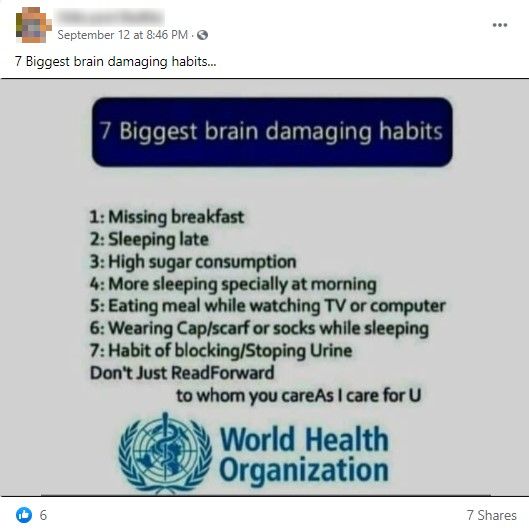A post accompanying an image enumerates the 7 biggest brain-damaging habits according to WHO is doing rounds on social media. Through this article let’s fact-check the claim made in the post.

Claim: List of 7 biggest brain-damaging habits by WHO.
Fact: When the same claim went viral in Nigeria, WHO clarified that this message has not originated from their side. While these seven habits do not directly lead to brain damage, they can lead to negative and life-threatening effects only when done in excess. Hence the claim made in the post is FALSE.
When the same claim went viral in Nigeria, ICIR debunked the claim by reaching out to WHO officials to which they clarified that this message has not originated from their side. With this, we can say that this list is not released by WHO. Further, let’s look at each of these seven habits.
Claim 1: Missing Breakfast
As per the studies published on National Institute of Health (NIH), there is no direct correlation between missing breakfast and brain damage, though missing breakfast may lead to up-regulation of appetite which in turn may lead to weight gain over time and deleterious changes in risk factors for diabetes and cardiovascular disease. These findings can be read here and here.
Claim 2: Sleeping Late
As per a blog by Harvard Medical School which quoted the findings of the study, both too much and too little aren’t good as they may lead to memory issues. On average, seven hours of sleep helps maintain memory. Also, the blog quotes a previous study which links poor sleep with higher risks of heart disease and stroke, type 2 diabetes, and depression.
Claim 3: High Sugar Consumption
As per WHO recommendations, we require 25 grams of sugar per day in our diet. Studies have listed how too much sugar leads to decreased cognitive function, anxiety and even resistance to insulin.
Claim 4: More sleeping specially at morning
There is no direct relation between sleeping in the morning and brain damage. However daytime sleeping eventually leads to lack of proper sleep in the night. When one does not sleep at night, they deprive the body and the brain of its natural healing and recovery processes. This will further lead to irregular sleeping patterns which mess up the body’s sleep cycle. According to a study, power naps of 10-15 minutes have proven to boost an individual’s productivity and mood.
Claim 5: Eating meal while watching TV or computer
According to a report by Harvard Medical School, distracted eating can lead to eating more than required and the food is not savoured while eating though no relation was found between cognitive function and distracted eating.
Claim 6: Wearing a cap or socks while sleeping
Generally, people in cold countries sleep with socks on. According to a study, feet warming using bed socks during the sleep period improved sleep quality by accelerating sleep initiation and maintaining the relaxation of the body while sleeping. This has proved beneficial in cooler countries. However, in a tropical country like India, sleeping with socks on will lead to an increase in body temperature and thereby increased sweating. Although there is no research to show sleeping with socks on leads to cognitive decay.
Claim 7: Habit of blocking urine
There is no research to show blocking urine leads to cognitive decay. But according to doctors, holding urine for too long can weaken the bladder muscles over time. “Holding urine for extremely long periods of time can also cause urinary tract infections due to bacteria build-up. In addition, it can increase the risk of kidney disease and in rare cases even risk your bladder bursting, a condition that can be deadly”.
To sum it up, while the above seven habits do not directly lead to brain damage, they can lead to negative and life-threatening effects only when done in excess.


